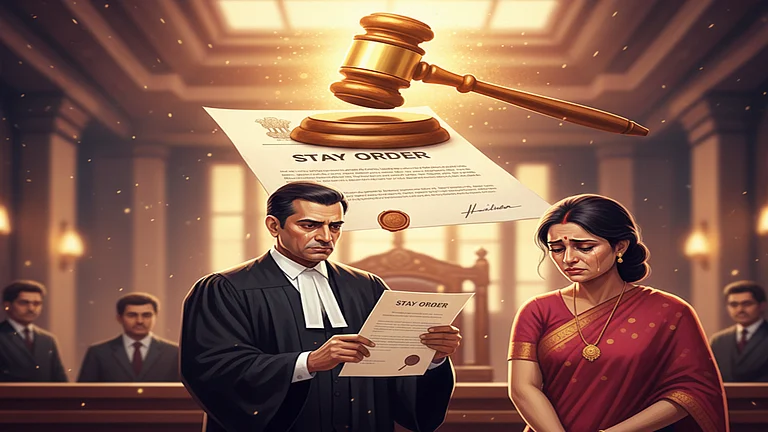In a recent judgement, a division bench of Delhi High Court, comprising Chief Justice DK Upadhyaya and Justice Tushar Rao Gedela delivered a ruling stating that a show cause notice (SCN) is necessary before granting an eviction order. The court referenced Rule 22(3)(1)(iv)(v) of the Delhi Maintenance and Welfare of Parents and Senior Citizens Rules, 2009, and emphasized that eviction orders carry serious consequences. Therefore, in the absence of an SCN, any eviction order would be considered vitiated or invalid.
The court said, “In the absence of the SCN as contemplated in Rule 22(3)(1)(iv)(v) of 2009 Rules, the order of eviction shall be vitiated and the reason is that eviction order has very serious consequences for the person who is occupying the property.”
The Case And Arguments
The bench was hearing an appeal by a daughter-in-law against the order passed by the divisional commissioner (Appellate Authority) following the 2009 rules. The authority has allowed her mother-in-law and late father-in-law’s petition and ordered the eviction of her daughter-in-law and her husband, as per a Live Law report.
The daughter-in-law challenged this order before the divisional commissioner, but the appeal was dismissed for the reason that they ill-treat the senior citizens. The single judge appellant authority maintained the order passed by the DM.
The counsel of the appellant argued that the property in question is not ancestral or self-acquired. It is owned by a company, and thus, the mother-in-law cannot ask for eviction of the appellant.
They also argued that a married woman has a right to reside in a ‘shared household’ under Section 17 (1) of the Domestic Violence (DV) Act, irrespective of whether she has any right, title, or beneficial interest in the property.
Court’s Observation
The court noted, “Section 17 provides that every woman in a domestic relationship shall have the right to reside in the “shared household”, whether or not she has any right, title or beneficial interest in the same. It is to be noticed that Section 17 contains a non-obstante clause, which would mean that the provisions of Section 17 shall prevail even if anything to the contrary is contained in any other law in force. Section 17 of the DV Act is extracted herein below.”
The court observed that the DV Act was enacted in 2005 and the Senior Citizens Act was enacted later, in year 2007.
It observed that the provisions of the Senior Citizens Act, by virtue of the operation of Section 3, have the overriding effect. However, Section 17 of the DV Act also contains a non-obstante clause. A non-obstante clause means 'the provisions of Section 17 shall prevail even if anything to the contrary is contained in any other law in force'.
Rule 22(3)(1) of 2009
The Rule 22(3)(1) of 2009 defines the procedure to deal with a eviction request made by a senior citizen or parents before a DM. How a DM should approach the complaint, issue SCN, the nature of the notice, and make an opinion after considering all relevant provisions of the Act.
Referring to the 2009 rules, the court noted that “Rule 22 (3)(1)(iv) of 2009 Rules requires the DM to consider all the relevant facts of the Act and if he is of the opinion that any person is not maintaining the senior citizen or his parents and ill-treating him and yet is occupying the property of any kind that they should be evicted, then he shall issue a notice calling upon the persons concerned to show cause as to why an order of eviction should not be passed.”
So, the rule establishes the procedure that the DM must follow before passing an eviction order. However, in this case, the court observed that the DM did not issue the SCN, making the entire proceedings vitiated.
The court also observed that the SCN should clearly mention the grounds for the proposed eviction order. The District Magistrate (DM) in this case should be of the opinion that the person against whom the eviction order is proposed is not maintaining the senior citizens.
It said, “The person against whom eviction order is passed is suddenly, sometimes deprived of a dwelling space or a space where he may have been carrying on a business or any other activity for earning his/her livelihood. If the result of passing of an order of eviction bears such serious consequences which is directly related to one's survival, in our opinion, holding that requirement of issuance of SCN as contemplated in Rule 22(3)(1)(iv)(v) of 2009 Rules is not mandatory, may have a cascading effect on the person who is proposed to be evicted.”
Court Judgement
The court held that “non-communication of the ground on which eviction order is proposed to be made in itself causes a serious prejudice to the person against whom such an order is proposed as it deprives him of the opportunity to submit his explanation to the basis of such opinion formed by the DM.” It set aside the orders passed by the DM and the appellate authority and allowed the appeal.
The court also noted that the mother-in-law has been living in the said property for a substantially long period, and even if it is not ancestral or self-occupied she has ample interest in the property. It rejected the appellant's argument that eviction is non-maintainable.
It ordered the revival of the petition proceedings made under Rule 22(3)(1) of Delhi Maintenance and Welfare of Parents and Senior Citizens Rules, 2009, and directed the DM to follow the procedure and pass the final order within two months.


















